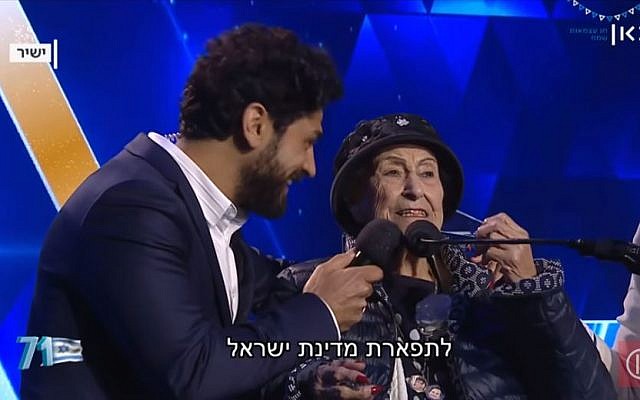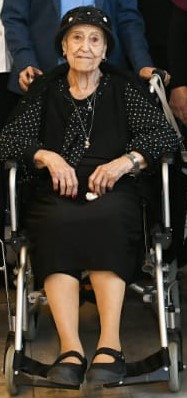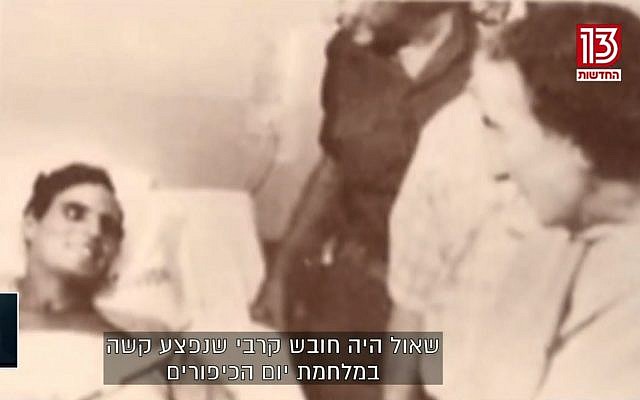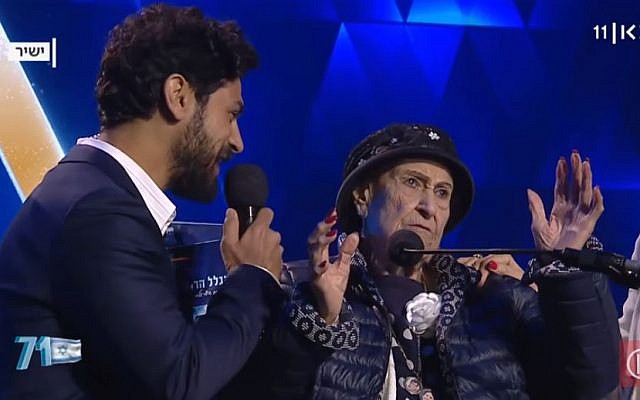Marie Nahmias spent her life raising unwanted, disabled children after ‘God heard her prayer’ for her wounded soldier son. Lighting Independence Day torch, she enthralled a nation

Throughout her lifetime, Maria Nahmias offered tenderness and support to 52 foster children on the margins of society, as well as eight children of her own. On Wednesday, a nation gasping for serenity got a small taste of the all-encompassing love she offered to those that needed it most over the years.
Lighting a torch at the 71st Independence Day celebrations on Mount Herzl, the “mamo” (“mother” in Tunisian-accented French) of Afula managed to bring together fractured, quarrelsome Israel in a way few others could. Her appearance appeared to spark a rare moment of national unity that has been praised for breaking through traditional divides in Israeli society.
The honor, one of the highest acts of recognition Israeli society can confer, was given to the 93-year-old great great grandmother for an almost unbelievable feat: quietly, and far from the public eye, taking into her home dozens of children no one else wanted — children abandoned by terrified parents in hospitals because they were born with physical deformities and diseases.

Almost 80 years ago Nahmias, 17 and going by the name Marie Sabah, fled Nazi thugs who hunted Jews in the streets of Tunisia during the German occupation from November 1942.
The Germans were pushed out by the British advance six months later, and she stayed in Tunisia for several years before moving leaving country along with most of Tunisia’s ancient Jewish community in the 1950s.
She arrived in Israel to a life of poverty in the ma’abarot, vast tent towns established by the fledgling state to house hundreds of thousands of immigrants, mostly from the Arab world, whose homes could not be built as quickly as they arrived. She lived in such an encampment in Hadera, near the coast then moved to a ma’abara in Afula, a hardscrabble town in the foothills of the lower Galilee.

She married and raised eight children there, eking out a dignified if impoverished existence on the social and economic periphery of Israeli society.
In 1973, her son Shaul was wounded during fighting in the Yom Kippur War, an event that would put her on the path of becoming a foster mother to dozens.
“My son was in a combat unit, and was wounded when he tried to rescue his commander. He was hospitalized for a long time. I took an oath and prayed that he get well, together with all the other soldiers. I vowed that if God gives me my son back, I’d be willing to do any mitzvah or mission that is given to me,” she told the Ynet news site last month.
God heard her prayer, she said, and her son recovered, becoming a municipal social worker in the city. One day, he called her and said he had a little girl who needed a home.
“That’s how it started. She was the first,” she said.

Nahmias would go on to foster 52 children, Jewish and Arab, with every imaginable physical defect and difficulty. They came from the Afula social services department, but not only from there. Children arrived at Nahmias’s doorstep from around the country, and even from beyond Israel’s borders.
“They knew everywhere that she was willing to take in and raise any child. Her message was that every person was made in the image [of God], no matter their origin,” her daughter Ricky told Ynet.
From her eight biological children — two, daughter Sari and son Shaul, passed away — she has over 100 descendants, including great-great-grandchildren.
The state committee that chose the torch-lighters singled her out as “a symbol of the immigrants who established Israeli society on a foundation of mutual solidarity and help to the needy, and of the thousands of foster families in Israel who opened their hearts to help children in crisis.”

At the ceremony Wednesday night, host Aviv Alush, who stood beside Nahmias as she began to recite the statement written for her by the ceremony’s planners, broke from the rigid text, turned to Nahmias and said, “Mamo, bless us, bless Israel.”
Nahmias, sitting in a wheelchair and smiling broadly in her heavy jacket against the night’s unseasonable cold, did not hesitate.
“May Israel be blessed, from all my heart, God will hear me, and the righteous [in Heaven], that it [Israel] rises ever upward, that we grow, that our soldiers don’t fall anymore — from all my heart, that the Jews and the Arabs and the Christians and the Druze, tomorrow we will all become one single hand,” she said. “We are all made by God, may he give us peace, and next year, may there be another 10 million [of us]…”
Nahmias was still mid-blessing when the audience, including Prime Minister Benjamin Netanyahu, responded with a raucous standing ovation, drowning her out.
Alush then nudged Nahmias to finish her set statement, which concluded, “for the splendor of Israel.” Nahmias stumbled on “splendor,” paused, smiled sheepishly and apologized, “I’m so excited.”
The moment, with Nahmias too excited to talk, seemed to unite Israelis across every divide.
A critic in the left-wing Haaretz broadsheet lavished praise on her ability to “break down walls of prejudice and disdain” for Mizrahi Jewish women and deliver “a beautiful and enlightened blessing.”
Right-wing Arutz 7 enthused that she “captivated the audience.”
The Haredi website Kikar Hashabbat informed its readers that Nahmias “overflowed with blessings and thrilled everyone.”
As reported by The Times of Israel
